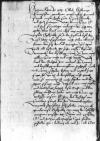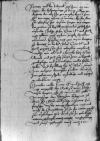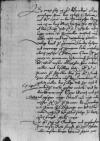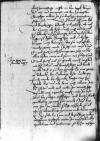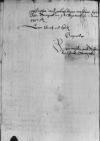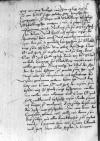Wyr konnen Ewer Genaden und Herlichkeiten fruntlicher wolmehnunge / nicht vorhalten, / das dweil wir / biss noch anher / aws unsern geschickten / so in die zcusanenkunft der ause steten afgefertiget / nicht haben abnemen konnen, / das sich der ⌊lubischen⌋ vornehmen / zcu eynen fride ader bestande hot zcihen wellen. / Besunder vormercken, / das diselbigen lewten / in irem muth willen / ymer mehr und mehr wutten / unde dweil dan / sulcher irer mutwil / der ⌊Cronen⌋ / und derselbigen underworffenen herschaft, / landt und lewten / schaden, / beswer und nochteil zcugefuget hot. / Ya och do demselbigen nicht geroten wirt / zu vormuten ist / mehr schaden / und boschwer zufugen muge. / Whorumb wir / noch reiffem und weitloftigen bewegen / diser sachen / und derselbigen ummbstant haben wir nicht konnen achterlossen / unserm ggnedigen hern, dem ⌊bisschof von Ermelant⌋, / sampt dem hern ⌊marienburgschem woywode⌋ / schriftlich zutzustellen, / wes sich obgemelte unso geschickten / von wegen der lubischen vornehmen / vorsehen teten. /
Dovon wir och Ewern Genaden und Herlichkeiten ein gleichmesige copie hirbey zcustellen thun, / dodurch als wol ir / als Ewer Genaden und Herlichkeiten so vil destebas / bey sich / was uns notigk / zu thun / mogen zu bedencken haben. / Dorneben och Iren Genaden und Herlichkeiten geschriben, / das wir vor guth ansegen / ⌊konigli[cher] maiestet⌋, unser allergnedigste herre, / sampt ⌊sein hochwirdigsten rehten⌋ / durch Ewer Genade sampt den andern hern rethen / ⌊diser landen⌋, / so itczunt bey koniglicher maiestet hof zu sein vormerckt werden angetreten wurde / und das ire maiestet / wir sich der ⌊lubischen⌋ vornehmen erstreckt / vorogen gestalt wurde / den was schaden, / die ⌊Cronen⌋ / und derselbigen underworffenen landen durch die krige, / so die lubischen erweckt / erlitten hot. / Ist wol tzu bedencken / alle gelider / derselbtigen thun sulchs fulen, / wehs sie aber / do diselbi[gen] krige lenger daroren und weren sulten / noch geberen muchten / hot ein ider vorstendiger leichtlich bey sich zcu erfinden. /
Sulten och die ⌊lubischen⌋ / itczunder einen andern konigk aufwerffen / und in ⌊Dennemarcken⌋ setczen / were leichtlich zu ermessen, / wes wir uns / und al / die hinder gesessenen landen / desselbigen nockberschaft / zu frewen hetten. / Dweil wir den itcz[i]gen / so al Dennemarcken / auf etzliche stette noch geweltig ist / gefurdert haben. / Sunderlich hetten wir uns weinig guts zu vorsehen / zcu Phaltz / Bremen Fridrich / doman vil itczunt redt / doch gruntlichs nichts an den tagk kompt der / wie man vornympt / mit dem ⌊homeister dewtschen ordens⌋ / im sunderlichem vornehmen stehen sal. / Und dweil nuh / aws disen und dergleichem bedencken und gelosten, / als wol der ⌊Cronen⌋ / als ⌊disen landen⌋ / nicht weinig / wil zcu bedencken und zcu betrachten kommen / und sunderlichen, / so dysen deniyschen und lubischen krygen / nicht dermosen, / das sie aufgehaben wurden / geroten wirdt. / So sehe wir / auf Ewer Genaden und Herlichkeiten vorbesserunge / vor guth an / dis alles bester weis und form, wie sulchs Ewer Genaden und Herlichkeiten ires hogen vor standes noch wol zu thuende werdet wissen mit ⌊koniglicher maiestet⌋ wol beratschlaget und beredt wurde / und yo zcu dem grunde / so aws gemeÿnen bedencken / der ordenunge ⌊diser lande⌋ gefunden wurde / bey obgemelten sachen / was zcu thunde / das man als denne nicht alleine / irer koniglichen maiestet radt und willen / im vorroth hette / besunder auch eigentlich wusten, / was ire konigliche maiestet / bey sulchem aufsetczen / und dartzu strecken genediglich gewogen sein wurde. / Auf das wir hier im ⌊lande⌋ / sulchs wissende, / so vil ehr / zu abwendunge gemeiner nodt / kommen mochten / dan sulte die ⌊Cron⌋ und derselbtigen underworffenen herschaft / weiter im aufschub / aller handelunge und hanttirunge, / so bisher gescheen gehalten werden. Ist bey idermenniglich leichtlich zu erfinden / wie treglich sulchs den eynwonern derselbigen / sein wurde.
/ Nuh / unsers genedigen hern, / des hern ⌊bisschofe von Ermelant⌋, / auf sulchs unser bewegen bedencken sey, / das werden Ewer Genaden und Herlichkeiten aws beigelegten / irer gnaden brief zcu vornehmen haben, / bey welchem ire gnade uns geschrieben hot, / das er / obangeczeigte unser sorgfeltickeit / unde bedencken beyfelt / und synnet sulchs an Ewer Gnaden und Herlichkeiten weiter zustellen, / wie Ewer Gnaden und Herlichkeiten sulchs aus beygelegtem copien / der briven, / so ire gnade an uns derwegen hot ergehen lossen / werdet zu vornehmen haben.
Wir haben och, Genedigen und Groshunstige Herre, nicht vor unguth geachtet, das die schmohe und vorclegunge, / so den ⌊hern reten diser landen⌋ durch her ⌊Stenzel Kostke⌋ boirgenet. / Itzunder bey ⌊koniglicher maiestet⌋ / gedocht wurde / und der abtrag / so derwegen billich dem lande folgen sall / bey irer Maiestet beschlossen / und alhier im lande / den rethen zcu thunde / her Kostken auferlegt wurde, / dan vor wore / unsers erachtens / sulchs hinder der ⌊rethe diser lande⌋ vorcleinunge / und gutter estimation nicht vorbleiben kan.
Wes wir aber von wegen der nhom, / so unsern burger / durch slegel / zwuschen den grentzen ⌊Pomern⌋ und der ⌊Marck⌋ gescheen / och von wegen / der beschatczunge, / so durch / seliger gedechtnis den alten in Got vorstorbenen ⌊churfurst⌋ / von wegen eynes fuermans / der die strosen uberfaren hett / unserm burger / von wegen den guttern, / so derselbtige fuerman geladen hot / auferlet. / Sulchs haben Ewer Genaden / und Herlichkeiten nicht alleine / aws unserm jungsten schreiben / vornomen, / bsunder auch / van unsen burgern, / szo derwegen an die koniglicher maiestet / Ewer Genaden und Herlichkeiten geczogen sein / zcur uberflus vorstanden. Welche wir aber und abermols bitten Ewer Genade und Herlichkeiten / sich sampt irem anligentt / genediglichen und freuntlichen / wellet b
<e>
folen haben / und diselbtigen bey ⌊koniglicher maiestet⌋ / sampt irem anligent / dermoszen fordern, / domit sie irer gelittenen scheden / erstattunge und ergetzunge uberkommen mochten.
Hirneben wellen Ewer Genaden und Herlichkeiten och nicht vorgessen / den radt / so vorm jaere unsen burgern als sie von ⌊Lublin⌋ gekomen im ausczuge / von ⌊Warszaw⌋ bojegenet ist domit ⌊konigliche maiestet⌋ / ummb sulche misteters zcu forschen / unsers vorigen schreibens noch / nus ernste den amptlewten, / so in den ortern gesessen / auferlegen thun. / Domit sie / in geburlichen vorhaftunge und strof / gebrocht werden mochten.
Es tragt sich och / zcu Genediger und Grosgunstigen / Hern, / das etzliche edelewte so wol ⌊koniglicher maiestet⌋ an den pomerrschen grentznen, wie och an denselbtigen ⌊hertzog⌋ thun gesessen al das ring vihe / so in ⌊Casschuben⌋ und etzlichen ortern von ⌊Pomerellen⌋ / vorhanden / aufgetriben wirt / und noch ⌊Wittenburg⌋ getriben. / Welchs dweil zu gemeynen landes beschwer und tewrunge, / och gemeyner leibs enthaltunge abroch / geschit.
Bitten wir Ewer Genaden Herlichkeiten gemeynen eynwonern ⌊diser landen⌋ zum besten ⌊konigliche maiestet⌋, unsern allergnedigsten hern, antreten willet / und diselbige bitten / ⌊furstliche irlaucht zu Pomern⌋ zu schreiben, / das ire furstliche genade irem amptmanne auf der ⌊Lawenburgk⌋ gebitten wollet, / das sulchs vihe hier auss der lande / nicht zu treiben gestat wurde / und dys duncket uns / auf Ewer Genaden und Herlichkeiten vor bessern wol gescheen moge. / Dweil wir nicht anders wissen / ⌊furstliche irlaucht zu Pomern⌋ / die ⌊Lawenburg⌋ und ⌊Butow⌋ zcu lehnrechte / von ⌊koniglicher maiestet⌋ halte. / Whorumb ⌊konigliche maiestet⌋ sulchs zu begeren guten fuegk haben moge. /
Es hot sich och Genediger und Grosgunstige Hern / unser rats frundt, her ⌊Johan Stutte⌋, / neben unserm burger ⌊Herman Schmit⌋ gar / hoch vor uns erclagt, / wie ihnen etzliche tach zo sie vom ⌊Hamburg⌋ hieher geladen hetten / tzwuschen dem ⌊hertzogthum zu Saxen⌋ und ⌊Mekelburg⌋ / vo etzlich
<e>
n mekelburgschen rewtern (wie sie sagen) sein aufgehawen wurden. / Dordurch sie zcu grosem schaden sein kommen / und dweil nuh etzlicher mosse / die hanttetiger kunt werden / und eigentlich vornommen wirt, / das sie in gemelten ⌊hertzogthum zcu Mekelburg⌋ seint gesessen / uns gebeten / dise sache / Ewer Genaden und Herlichkeiten zu vorstendigen und zcu bitten, / das Ewer Genaden und Herlichkeiten etzliche brive / von ⌊koniglicher maiestet⌋ an ⌊beide hertzogen⌋ zcu ⌊Mekelburg⌋ / aussbrengen wellet geruchen. / Durch welche ⌊ire maiestet⌋ den schaden / den iren bescheen / zu gemutte furen thet / und strof / uber die uberfarende / mit erstattunge / der unsern genommenen guttern / bogern thet / und dys bitten wir Ewer Genaden und Herlichkeiten den unserm zcum besten / zu thunde / nicht beschweren wollen, das wollen wyr allewege ummb Ewer Genaden und Herlichkeiten widderumb beschulden / unser radts frunt och burger zu vordynen. Bitten sulche brife / mit den irsten / uns zuschicken, / dan was dovor der cantzeleie geburen wil / wollen wir dovor sein, das sulchs mit aller danckbarheit sal erstatt werden. /
Hiermit thun wir Ewer Genade / und Herlichkeiten dem aller hogsten / in langer geszuntheit und gelugseliger wolfart befel[en].


